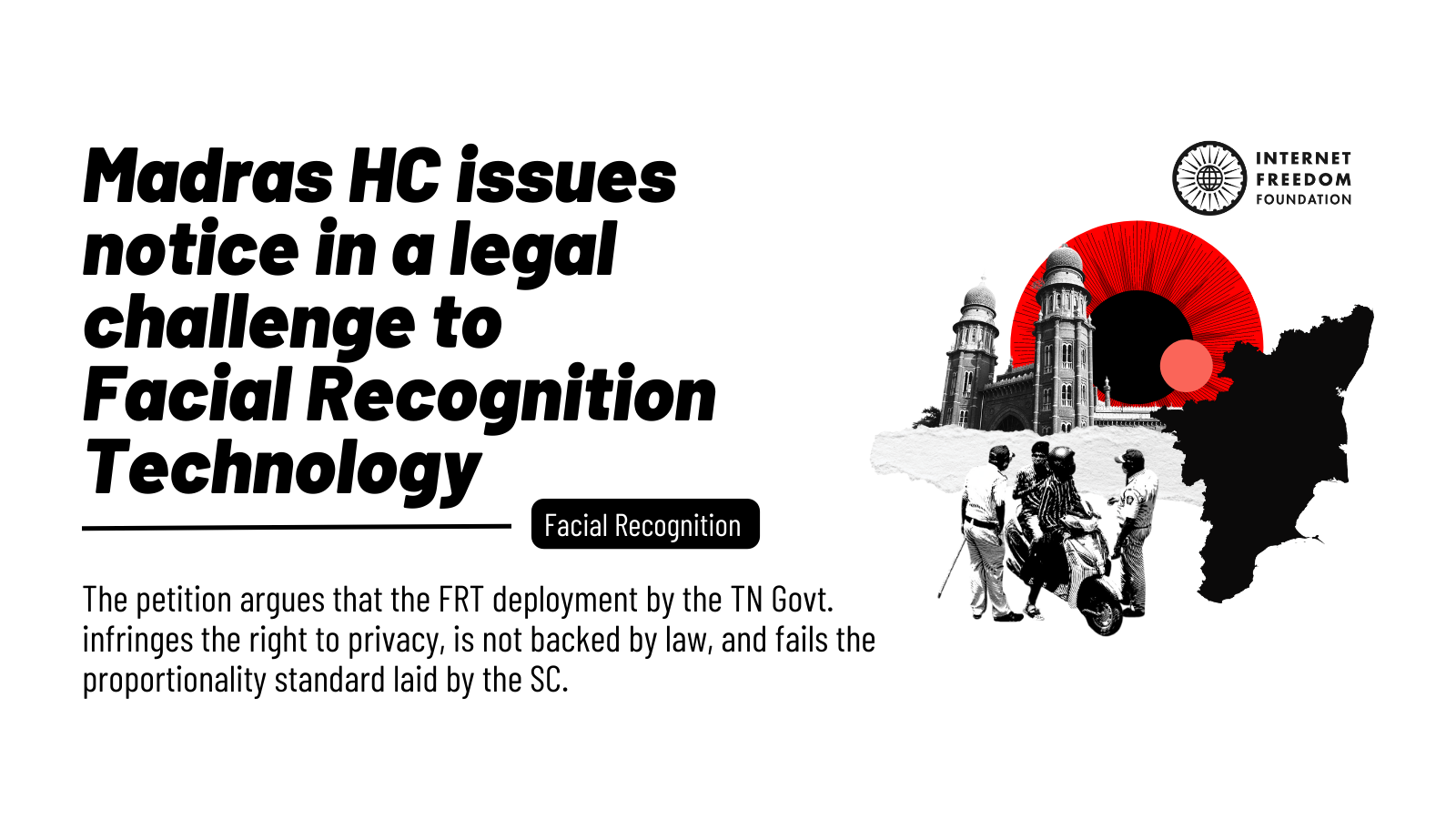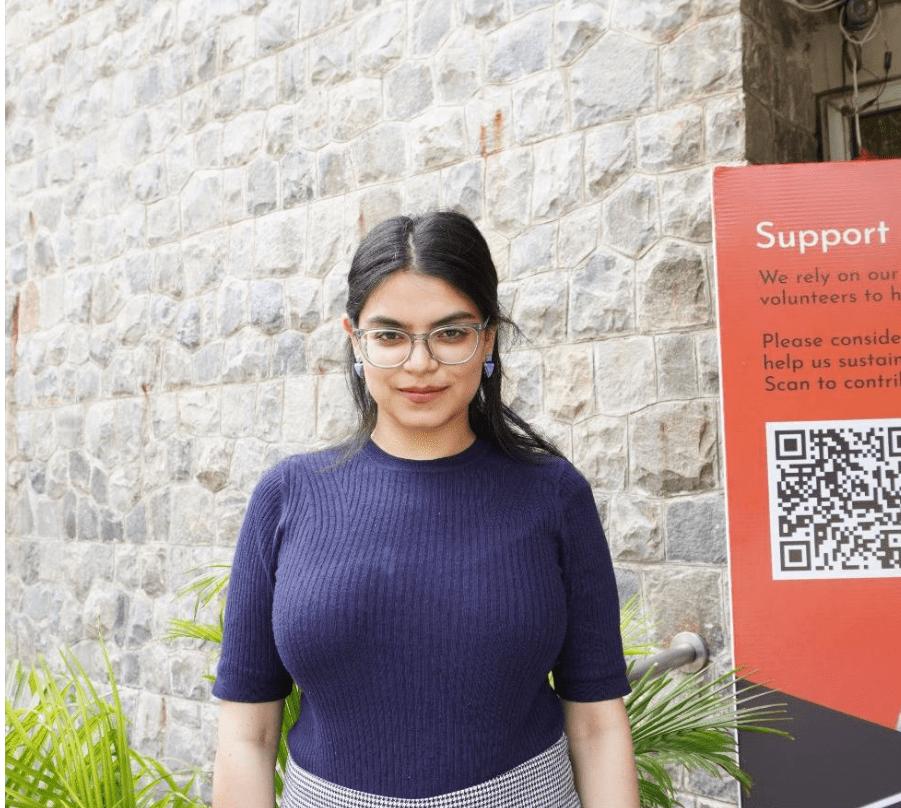
tl;dr
The Madras High Court has issued notice in a petition filed by Mr. Akhilesh Kumar Kandasamy, a long-term resident of Chennai, challenging the installation and deployment of Facial Recognition Technology (“FRT”) across the State of Tamil Nadu and specifically within the city of Chennai. Notice was accepted by the Counsel for the Tamil Nadu government. In his petition, Mr. Kandasamy argues that the deployment of FRT in Tamil Nadu is through covert and non-consensual means, is without any statutory basis, and does not provide the citizens–subject to this intrusive surveillance–information about how their sensitive personal data is being stored, shared and used. The petition argues that the FRT deployment by the Tamil Nadu government infringes the right to privacy, is not backed by law, fails the proportionality standard laid by the Supreme Court, and is discriminatory at its core.
Why should you care?
The unguided and unbridled deployment of FRT systems without any built-in safeguards, particularly by the police, can lead to a host of significant harms. It poses a direct threat to individual privacy since large amounts of sensitive personal data are collected and processed without any consent, transparency or procedural safeguards. The deployment of such systems perpetuates the creation of a surveillance regime, where citizens are constantly placed under the watchful eye, in direct violation of their fundamental rights.
Background
In March 2022, while returning from an evening outing, Mr. Kandasamy and his brother were stopped by two police officers. The officers questioned their residence, profession, and purpose of the outing. Disregarding Covid-19 rules, the officers told them to remove their masks and took their photos without consent, citing it as a mere "formality" when asked.
Disturbed by the incident, Mr. Kandasamy filed an RTI application on March 19, 2022, asking about Tamil Nadu Police's use of FRT, which yielded limited information. Eventually, Mr. Kandasamy learned that Chennai Police has been using Face Recognition Software V 1.1 via a mobile app to gather citizens' and suspects' details since October 4, 2021.
Due to the limited disclosure of information, and lack of verifiable information in the public domain, Mr. Kandasamy proceeded to file another RTI application on September 29, 2022, seeking details from the State Crime Records Bureau, Chennai (“SCRB”), about the deployment of FRT by Tamil Nadu Police. The Responses revealed that the Tamil Nadu Police were employing existing legal provisions under Tamil Nadu District Police Act, 1859 and the Code of Criminal Procedure, 1973 to authorise the use of FRT. Further, the FRT Software deployed by the Tamil Nadu Police utilises images maintained at the State Data Center (“SDC”) in Chennai.
How does FRT function?
FRT is generally used to refer to technology–consisting of relevant hardware and software–deployed for potentially matching a human face from a digital image or a video frame against a pre-existing database. The technology involves the analysis of facial images to verify or identify individuals. It functions by extracting specific facial data points to form a template, which is then compared against an existing database.
For verification, a real-time photograph of an individual is matched with a pre-existing image in the database available with the authorities (1:1). Whereas, for identification, an individual’s photograph is compared with images in the authority’s database to establish their identity (1:many).
FRT systems generate a probability or confidence score by comparing a suspect’s image to a police database of known criminals, such as through the Crime and Criminal Tracking Network System. For verification, multiple potential matches are produced, accompanied by confidence scores indicating the likelihood of a correct match. However, the final determination typically rests with a human analyst. This introduces a potential for misidentification, as the FRT system proposes several matches, but the human analyst ultimately makes the final call. As such, this process can also lead to bias, as the analyst’s personal prejudices may influence their final decision. This bias could be affected by factors like race, religion, or community, impacting their decision-making.
Use of FRT by law enforcement in Tamil Nadu
The deployment of FRT in Tamil Nadu is shrouded in secrecy, with no noticeable signs or indications of its operation within specific areas. Additionally, the government has not publicly shared policies concerning data processing, retention, sharing, or deletion.
As per news reports, the Tamil Nadu government is actively progressing towards installing and deploying FRT systems across the state. For instance, by April 2022, the government had equipped over 40,000 personnel in the field and police stations with FRTs. Moreover, since 2018, the government has installed facial recognition-enabled CCTV cameras in 100 “crime-sensitive” locations and had commenced operating the technology in Kancheepuram and Madurai as of March 2022. This indicates that the purpose of introducing
FRT is for mass real-time identification, rather than targeting specific individuals of interest. Critical information regarding procedural safeguards, potential restrictions on harmful usage, and technical details of the FRT systems is not available in the public domain. Similarly, there’s a lack of information on topics such as the accuracy of deployed FRT applications, the threshold percentage for a probable match to be considered reliable by authorities, human intervention in the process, and the source of photographs/identities used to create the databases against which FRT is applied.
In essence, transparency and accountability are sorely absent from the process. The clandestine manner in which FRT is being deployed across Tamil Nadu subjects the entire populace to a veil of constant surveillance, disregarding their fundamental rights. Further, these systems can result in highly biased and discriminatory outcomes, exacerbating the already existing societal inequalities – with serious consequences for the marginalised communities. Moreover, the deployment of such systems without robust regulations and safeguards can also undermine due process, placing vulnerable individuals and communities at risk of false identifications and wrongful accusations.
Mr. Kandasamy approaches the Madras High Court
Concerned with the rampant, unbridled and clandestine use of FRT by the State of Tamil Nadu, and the absence of any procedural safeguards, Mr. Kandasamy, with legal support from IFF, has filed a petition in public interest on behalf of residents of Tamil Nadu. Through the petition, Mr. Kandasamy argues that the deployment of FRT in Tamil Nadu is in flagrant violation of citizen’s fundamental rights, specifically contravening Articles 14, 19 and 21 of the Constitution. Among his other arguments, Mr. Kandasamy has submitted the FRT is unconstitutional since:
- One, the Supreme Court in K.S. Puttaswamy v. Union of India & Ors (2017) 10 SCC 1 held that the government cannot curtail the right to privacy unless such restriction is grounded in law, and is necessary and proportionate. The manner of implementation of the FRT by the State of Tamil Nadu infringes the right to privacy, as it fails the five-pronged proportionality test laid by the Supreme Court;
- Two, the FRT deployment lacks legislative authorisation and thus, fails the test of legality. The Tamil Nadu government’s reliance on Tamil Nadu District Police Act of 1859 and Code of Criminal Procedure of 1973 is inherently flawed;
- Three, even if it is held that the FRT is sufficiently grounded within existing legislation, it still fails the other prongs of proportionality requirement, specifically, rationality, necessity, balancing and safeguards against abuse; and
- Four, the deployment of FRT is demonstrably discriminatory in nature, and hence, without prior impact assessment, it violates Article 14 of the Constitution.
Proceedings before the Madras High Court
The matter was listed as item No. 38 before a bench of the Madras High Court comprising Chief Justice Sanjay Vijaykumar Gangapurwala and Justice P.D. Audikesavalu. After hearing detailed submissions, on the grounds described above, by Adv. Suhrith Parthasarathy appearing on behalf of Mr. Kandasamy, the Madras High Court issued notice. Notice was accepted by the Counsel appearing on behalf of the State of Tamil Nadu. Next date of hearing is October 5, 2023.
We thank Mr. Kandasamy for allowing us to lend our expertise in this important matter. We have been extensively working on Facial Recognition Technologies through Project Panoptic, which has informed a lot of work that went into the petition. We are especially thankful to Mr. Suhrith Parthasarthy for leading the arguments before court. He was assisted by Advocate Ashwini Vaidialingam and the legal team from IFF comprising Gautam Bhatia, Vrinda Bhandari, Abhinav Sekhri, Tanmay Singh, Radhika Roy and Gayatri Malhotra.
Important Documents
- Petition filed by Mr. Kandasamy against the illegal deployment of FRT in the State of Tamil Nadu [Link]
- Previous blog post titled ‘Telangana High Court issues notice in India’s first legal challenge to the deployment of Facial Recognition Technology’ [Link]
- Project Panoptic documenting instances of projects employing FRT in India [Link]
- Previous blog post on Project Panoptic regarding the illegal and unconstitutional use of FRT [Link]

